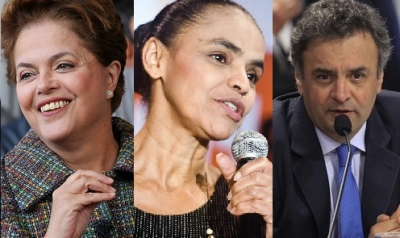With the polls in on Sunday evening, it was evident the hype surrounding the Presidential campaign of Marina Silva – the senator, environmental campaigner and former environment minister – had not translated into success. The elections saw Brazilians all over the globe (including your author) attend their local polling station, embassy or consulate to cast their vote on Sunday, with Marina finishing in third place. The results mean the top two candidates – Ms Dilma Rousseff from the current ruling PT (Partido dos Trabalhadores; Workers Party), and Mr Aecio Neves from the established PSDB (Partido da Social Democracia Brasileira; Social Democratic Party of Brazil) – head for a run-off election on 26th October in which Dilma Rousseff is the favourite to be elected for another four years.
Marina Silva was catapulted into the spotlight entirely by fate. On 13th August, Presidential candidate for the PSB (Partido Socialista Brasileiro; Brazilian Socialist Party) Eduardo Campos was killed in a plane crash. Marina was Eduado’s running mate, and on his death was selected as the Presidential candidate for the PSB. Up to that point, Dilma looked to have the election tied up – despite a stalling economy and allegations of corruption at the state-owned petroleum company Petrobras. But it appeared that Marina’s entry to the race, and her ability to tap into the anti-politics sentiment, would change everything.
Marina’s apparent appeal stemmed from her anti-establishment credentials. Growing up in the state of Acre deep in the Amazon rainforest as the daughter of impoverished rubber-tappers, she repeatedly referred to her background of growing up poor, often without enough food for all the family. She became a passionate environmental campaigner, rising to become a senator for her home state and, for a short time, environment minister under Dilma’s predecessor, President Lula. Marina seemed to tap into the sentiments of those Brazilians who took to the streets to show their dissatisfaction with the government following the huge spending on the World Cup and ever-present stories of government corruption. She also attracted support from young voters through her use of social media. Opinion polling had often put Marina very close to, if not ahead of, Dilma, with Aecio Neves – the grandson of Brazil’s first democratically elected President following the ending of the military dictatorship – languishing in third place.
But Marina’s support melted away. Attack ads called into question her lack of experience, and the financial backing she received from large corporations previously connected to the dictatorship. She was also accused of wanting to end the hugely popular Bolsa Familia programme, which provides increased welfare support in exchange for families ensuring their children attend school and receive necessary vaccinations. With the incumbency factor also working in Dilma’s favour, and the inroads she is making in tackling corruption, voters may have told polling companies what they felt in their hearts. But faced with the old adage of better the devil you know – they chose to stick with the establishment figures of the current Mme President and Aecio Neves.
Marina’s support generally came from the centre-left and from the poor, so it is likely her votes will almost certainly now go to President Dilma in the run-off election. Despite allowing the economy to stagnate, Dilma has expanded national welfare programmes which have lifted more than 12 million Brazilian families out of poverty, the most significant of these being the Bolsa Familia programme. Those who preferred Marina’s business-friendly approach will inevitably lean back towards Aecio Neves, whose PSDB party is not short of economic credentials. The party was last in power under President Ferndando Henrique Cardoso, who is widely praised for bringing in a number of stabilising economic reforms to stem eye-watering inflation.
With the run-off election set for the end of October – in which the top two polling candidates are on the ballot in a head-to-head – it is very likely that Dilma Rousseff is set for another four years as President of one of the world’s largest economies. If she wins, her challenge is to unite the vast country behind her leadership and steer it through the stormy economic waters. But one thing is certain and should still worry the established political parties in Brazil – Marina Silva is a tenacious politician and campaigner, and has always found a way into the spotlight. We have definitely not seen the last of her.
Antonio Dorileo is a Senior Account Executive at PLMR and holds dual British-Brazilian nationality.




